
The UK’s fishing fleet depends on migrant fishers. Geographical investigates the impact of updated visa requirements, which some fear pose a threat to the future of the industry
By Christine Ro, Laura Cole, Aliya Bashir & Imran Muzaffar
Ruban speaks in a low voice. Worried about being overheard, he asks to move farther from the small, Scottish harbourside. The Indian fisherman doesn’t want to be seen talking to an outsider. Settling in an out-of-the-way cafe, he explains his caution. The captain of his fishing boat, who had, for several years, ‘been okay to work with’ has been verbally abusing the crew and increasing physical work to ‘unbearable’ limits. ‘It’s like he had a mental breakdown,’ says Ruban, ‘but out there’ – he gestures in the direction of the coast – ‘there’s no-one to see it, or believe us’.
Ruban (names have been changed and locations disguised as the migrant fishers we interviewed fear being blacklisted) describes his hope to be sponsored for a skilled worker visa, the UK government’s recent fix for the problems of exploitation and inconsistent visa rules in the fishing industry. Experts warn, however, that it could wind up a partial solution, and in some cases, may increase inequalities and danger in what’s already the UK’s most dangerous industry.
TEN MONTHS IN TRANSIT
The boat Ruban works on is a traditional scallop trawler manned by four crewmen and a skipper. He has done the job for four years, as one of around 10,000 fishers in the UK (2022 figures) who work the nation’s fleet. Although, technically, he has never worked in the UK. According to the most recent data from Seafish, the UK public agency supporting the seafood sector, 28 per cent of the crew of UK fishing vessels are non-UK nationals. Others have estimated that the figure is much higher. Whatever the exact number, foreign-born fishers ‘have been the backbone of the UK fishing industry,’ in the words of David McCandless, the chief officer of the North Eastern Inshore Fisheries and Conservation Authority.
For ten months a year, Ruban lives on the boat. ‘It’s dangerous work,’ he says. With everything important ‘happening above your head’, life at sea revolves around the central trawl winch that pulls up scallops by the thousands and spills them onto the open deck. ‘We sail for six days and land the full catch on the seventh.’
Every week, Ruban helps bring around 35,000 kilograms of scallops into port – the equivalent weight of a herd of 45 Highland cattle – but never officially enters the UK himself. The restrictions of his visa mean that he has a constant ‘in transit’ status. Immigration-wise, he’s tied to his vessel, legally required to sleep on the boat and unable to physically enter the UK apart from brief port visits. Even if the fishing boats aren’t equipped for long-term accommodation. Of all the non-UK nationals in the nation’s fishing fleet, the majority are in this position.
Intended initially for merchant seafarers on vessels docking at international ports, transit visas give non-UK nationals a small window of time to enter or travel via the UK. The way they’ve been used in the fishing industry, however, has long been criticised by campaign rights groups as a ‘loophole’ for UK companies to hire workers on lax visa terms, outside of the nation’s labour protections. ‘They have abused it,’ says Chris Williams, a fisheries expert at the International Transport Workers’ Federation (ITF).
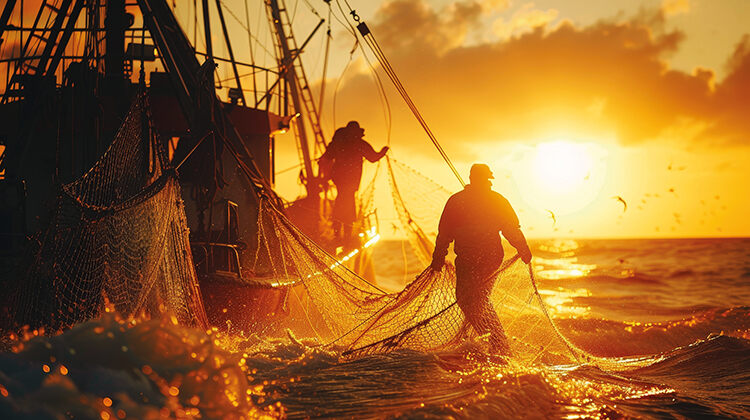
In 2022, the government clarified these murky waters. The National Borders Act made explicit that such a use of transit visas was illegal – but only within the UK’s waters – which extend 12 nautical miles (about 22 kilometres) out to sea. In April 2023, it stipulated that non-UK fishers must have a skilled worker visa to work within this 12-nautical-mile halo.
Without one, even if his employing company has multiple fishing boats, Ruban is tied to the boat with an abusive skipper. ‘I’m done with it now,’ he says. Where the tonnes of catch are usually hauled by crane onto the harbour, ‘the skipper recently made us haul by hand’. Ruban asked to return to India for his contracted two-months leave. In response, his captain allegedly threatened to dock a month’s pay. Ruban has two choices – remain trapped on the vessel or leave out of pocket.
For access to better working rights and higher pay, he needs someone to sponsor him for a skilled work visa. And for that, he needs to pass the UK government’s English test requirement.
MAKING THE GRADE
Across the Irish Sea, Abhishek is also hoping for a sponsored visa. He has been fishing in Northern Ireland for a decade, due to the better pay and lower competition for fish compared to back home in Tamil Nadu. ‘In my village, there are too many fishermen,’ he explains.
The biggest hardships are the winters, when the crews bundle up in coats and wear thick blue gloves because it’s hard to feel their fingers otherwise; missing their families (Abhishek chokes up when showing a photo of his son digging in the garden); and struggling to obtain skilled worker visas. His current pay is also paltry, although it’s much higher than what he would be able to earn back home. Abhishek is contracted on just £1,100 a month, with bonuses based on the amount of prawns caught. For British prawn fishers, all wages would be on a share catch basis, which typically leads to substantially higher earnings.
Migrant fishers on transit visas frequently report not being paid for overtime, and their hours not being logged accurately. In practice, their pay often amounts to less than the minimum wage. A report by the University of Nottingham’s Human Rights Lab found that the average salary of a transit visa fisher in 2021 was £3.51 an hour.
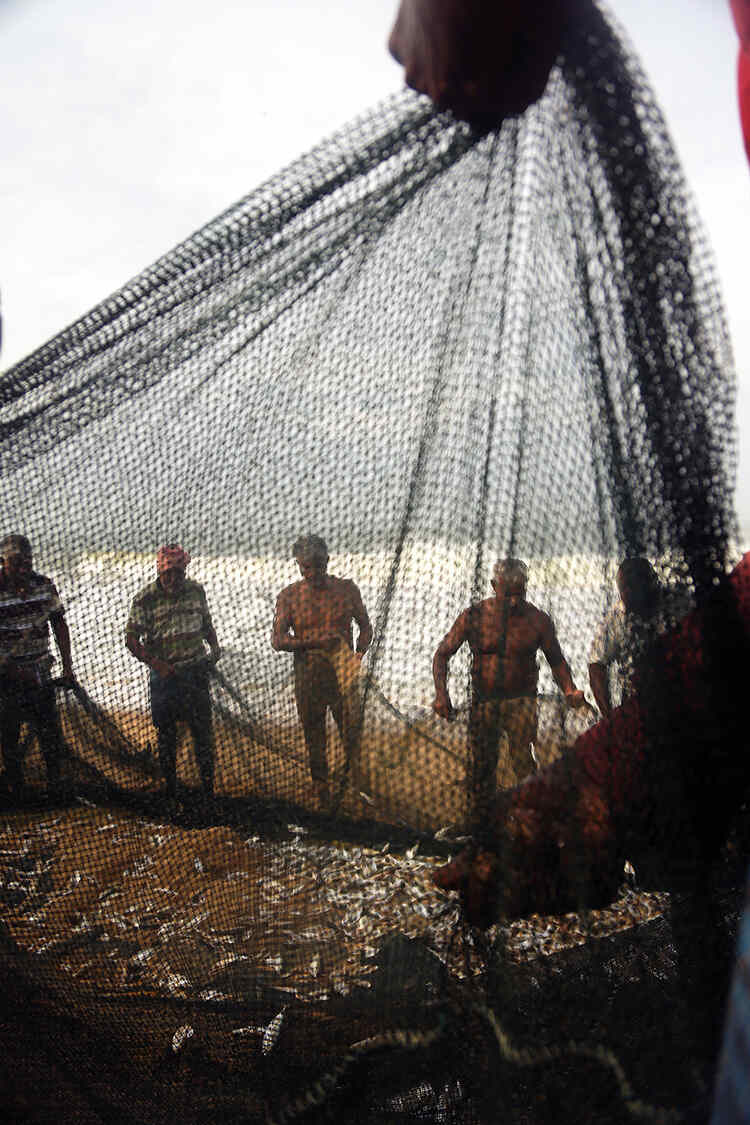
As a deckhand, Abhishek can’t control where the boat fishes, but he could still face detention and deportation if his captain decides to stray within UK territorial waters. The skilled worker visa became the only legal option for foreign nationals to fish within 12 nautical miles – as well as a ticket to higher pay and a more secure immigration status. But the high English-language requirement might stand in his way. Most of the migrant fishers he knows have failed the English exam and have to wait a while for the next one in India; they’re not allowed to apply for the skilled worker visa from the UK.
‘The UK government is looking only for English knowledge,’ Abhishek says. ‘You can speak good English, you can fish here.’ But the kinds of English skills required under the skilled worker visa have nothing to do with fishing skills, he emphasises, while flipping through a sample test he’s been going through on weekends. During the week, when he might only get four to six hours of sleep a night, time for study would be tough. His contract doesn’t specify hours of work, rest or overtime.
Under the skilled worker visa, fishers need to have at least the same English level as CEOs, clinical psychologists and barristers. Remarkably, the level of English required for a foreign-born English teacher is the same as for a foreign-born fisher. ‘That is a big challenge for most of the migrant fishers in the sector,’ says Jessica Sparks, an assistant professor at Tufts University who has researched working conditions on UK fishing vessels. ‘Even guys who have been in the UK for 15, 16 years, they’re struggling to pass the B1 language exam.’
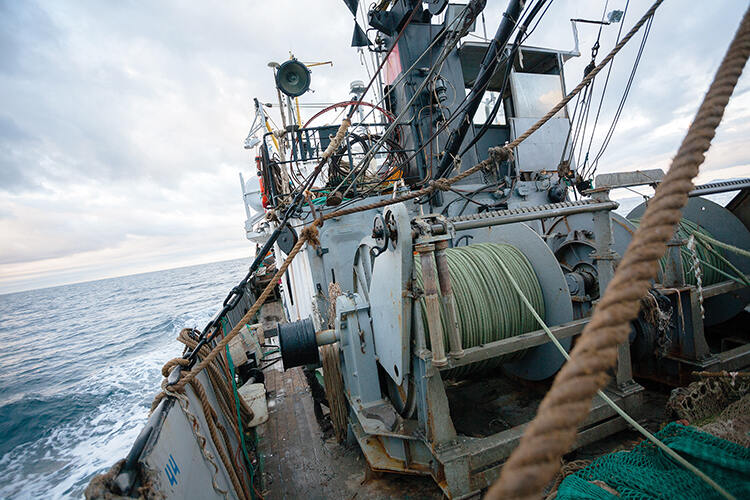
Some have been calling for the language requirement to be relaxed. The Northern Irish MP Jim Shannon has argued that the lower, A2 level is sufficient for safe communication at sea. ‘Fishers have raised concerns that setting such a high bar is a barrier to many capable workers joining Scotland-based crews,’ says Ariane Burgess, a member of the Scottish Parliament for the Highlands and Islands. ‘We’d prefer more practical, tailored assessments of language capability relevant to the sector, as well as more proactive monitoring of working conditions and safety.’
Safety is, of course, a prime concern. ‘You can lose a hand if you put it in the wrong place,’ says Ruban. According to the director of operations for Seafish, Aoife Martin, ‘fishing is the most dangerous occupation in the UK, so being able to communicate onboard a fishing vessel is really important’.
But as for the specific B1 level for a skilled worker visa, ‘I’ve never seen any rationale for that particular level,’ says Peter Walsh, a migration expert at the University of Oxford. ‘It’s perhaps somewhat arbitrary.’
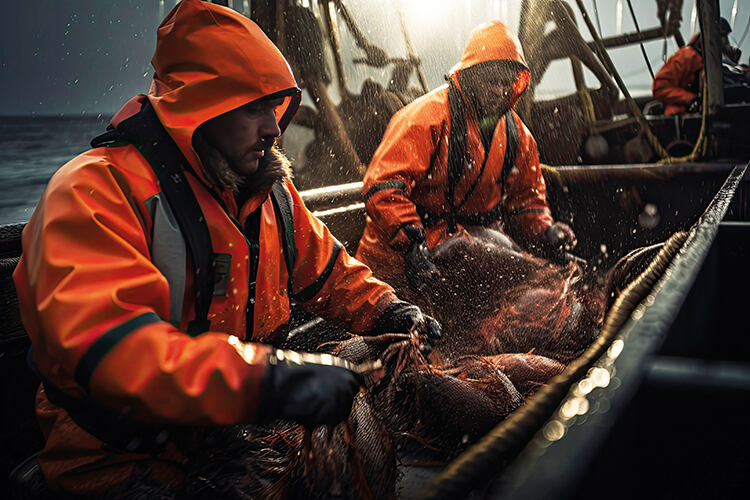
An alternative would be to allow an industry-specific language test. Sparks calls the B1 English test ‘an exam that’s not really suited. It’s not based on maritime English. There are actually English language exams set out at the international level that are specific to maritime activities, which in this case would probably be most useful.’
An example is the Marlins English language test for seafarers. The ITF argues that this industry-appropriate test should be used. ‘The skilled worker test is about being able to write an essay, when it should be about safety,’ says Chris Williams, a fisheries expert at the ITF.
Advocates for fishers’ rights have warned that an overly stringent language requirement could actually increase certain risks for workers. ‘There is concern that with the B1 English language exam, if the industry cannot recruit local crew and continues to recruit migrant crew, are they going to be forced to select for English language skills versus fishing skills moving forward?’ Sparks says. This worrying trade-off may indeed be happening. A skipper has reported that after he asked for a crew member with maritime experience, a recruiter sent him a young Indian man who had only previously worked on a cruise ship.
WHO PAYS?
Passing the English test is necessary for obtaining a prized skilled worker visa. But it’s not sufficient, and ‘should not be seen as a panacea,’ says Sparks.
Arun has had ups and downs while shuttling back and forth between India and the UK to fish on a transit visa. From May to September, he would rely on quick-cooking foods such as frozen pizzas because of the long, exhausting hours netting and then tailing prawns. While he and other migrant fishers are supposed to have rest breaks, ‘on prawns it’s not possible’.

Arun is building a house in Kerala, but he can’t afford to finish it. In any case, it’s not clear who would occupy it. He’s hoping to find a wife soon, although ‘with this social life it’s hard to find someone… and to give time to someone.’ The main hardship now is uncertainty about his return to the UK, as multilingual, soft-spoken Arun is one of the lucky few to have passed the English test. However, he doesn’t have a certificate of sponsorship. The fishing company he worked for urged him to obtain all the clearances but then asked him to pay all of the visa fees himself, which he can’t afford. The company also previously ended his contract early, so it has a history of unfulfilled promises. In the UK’s small and tightly knit fishing communities, Arun has little chance of ending up with a better employer, and is nervous about alienating the one he has. Arun’s part-finished house and anxious wait for news demonstrate that clearing the English-test hurdle isn’t a guarantee of better working conditions.
It’s best practice for the fishing companies to pay costs, including those for the visa and health insurance, says Sparks, who was among those campaigning for a skilled worker visa so that migrant deckhands would have a guaranteed minimum salary. However, the law doesn’t require employers to pay such costs. So fishers like Arun face high upfront costs for complex visa applications, on top of debt loads for recruitment fees paid initially.
THE HOSTILE IMMIGRATION ENVIRONMENT
Fishing epitomises some of the unintended consequences and contradictions embedded in the UK’s immigration policy. The ITF’s Williams says the hostile environment and the government’s immigration policy have ‘left transit visa deckhands in the lurch’.
UK immigration officials have brushed aside suggested reforms to the English language requirement for migrant fishers. Such considerations appear secondary to the overall goal of reducing immigration. ‘I think that any kind of restriction can reasonably be viewed as’ having the aim of reducing the number of applicants, Walsh says. ‘In practical terms, having the language requirement… will prevent some people from being eligible.’
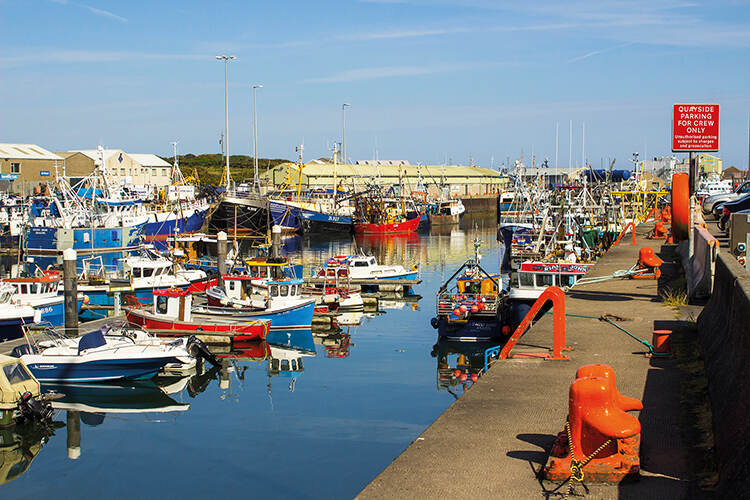
Data obtained through a Freedom of Information request reveals that as of December 2023, 34 fishing companies have received certificates of sponsorship, with 18 granted after the April 2023 legislation change. As for visas received, as of the end of 2023, only 54 skilled visa applications, at the most, had been granted in the fishing sector – a small dent in the 2,000 estimated non-UK fishers employed in the industry. There are indications of an uptick, though still modest, in 2024 so far. Of the few migrant fishers to pass the English test, one has an MBA, another a degree in physics.
‘So far, it’s hard to tell if the skilled visa could work, because we have a small sample size,’ says Sparks. A worst-case scenario would be that the high language barrier and the costs of the visa encourage fishing companies to hire migrants on transit visas and move their fishing grounds outside territorial waters, where there are fewer protections for fishers.
The transit visa scheme, she says, ‘just puts people at risk’. The government has been clear that it won’t consider anything outside of that boundary as work in the UK. The loophole, born out of vague laws, now hangs on physical geography, ‘even if fishers are working for UK-listed companies, on UK-flagged vessels, constantly in-and-out of UK ports’, says Williams.

Fishing industry stakeholders have actively tried to lower wages associated with the skilled worker visa. Harry Wick, CEO of the Northern Irish Fish Producers’ Organisation, said that the industry’s challenge is in ‘staving off the new minimum salary’ of £38,700 for skilled visa workers. He said the salary rise would make overseas crew ‘unemployable’ and warned it makes ‘the transit visa the only viable option’.
Now, because of the pay thresholds set by the skilled worker visa, foreign-born fishers on skilled worker visas could even out-earn their UK-born counterparts. Wick told Geographical, ‘I don’t think there is a fisherman or fisherwoman in the world who doesn’t deserve a minimum salary of £38,700, but the simple truth is, our fishermen aren’t being paid enough for our catch to support that level of salary.’
He blames low salaries, in part, on the difference between the price fishing companies are paid versus the retail price. ‘If you can answer how the price of a prawn can increase [six-fold] between leaving the boat in pristine condition and reaching the supermarket fish counter in a shoddy state, then you can answer why fishing boats can’t afford to pay 61 per cent more salary at four months’ notice,’ he said. ‘You could also perhaps answer why we are largely reliant on crew recruited from overseas and struggle to attract locals to our profession.’
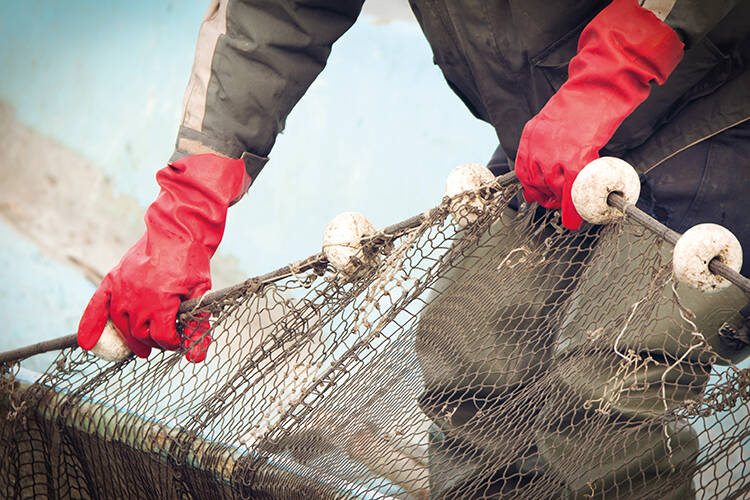
The ITF’s Williams says that as long as the transit visa continues to be used in the fishing industry, non-UK fishers won’t have the rights and protections at work that they should have. ‘While that’s not really the fishing industry’s fault, it does mean employers are enabled to pay less than they should,’ he says.
As there are likely fewer UK nationals who want to fish than the industry requires, he says that the ITF wants a fishing-specific visa for UK flagged vessels, not visas that still depend on where the boat fishes. ‘The way around a labour shortage is not to incentivise and enable a race to the bottom and labour exploitation.’
While Conservative politicians have called for more UK nationals to go into fishing to reduce the reliance on foreign workers, this just isn’t happening. Fishing vessels are sitting empty. Further, Seafish’s Martin says, ‘The immigration changes mean that in some instances, people have exited the industry. This is because vessel operators just can’t get crew, either at home or from abroad.’
This spring, deckhand jobs were added to the Immigration Salary List, a list of jobs eligible for a 20 per cent wage cut – cutting skilled worker fishing salaries to £30,960. This was against the recommendation of the Migration Advisory Committee, an independent advisory body, which feared the lower wage list puts migrant workers at risk of exploitation. The minister for farming and fisheries, Mark Spencer, used the rejection of the advice as proof of the government’s commitment to the fishing sector and said ‘the government continues to support the sector to attract the labour it needs’.
When Geographical questioned the government, a spokesperson for the Department for Environment, Food and Rural Affairs said: ‘We are [supporting the fishing sector] through our existing visa routes to recruit from overseas and have offered a generous support package to help them adjust to the UK immigration system,’ such as through the £100 million UK Seafood Fund. Of this figure, however, only ten per cent was made available for skills and training, and applications closed more than a year ago.
For now, even as the government’s policy prioritises language, migrant fishermen still find themselves in a culture of silence. ‘Why would I complain if no-one wants to listen?’ asks Ruban.





